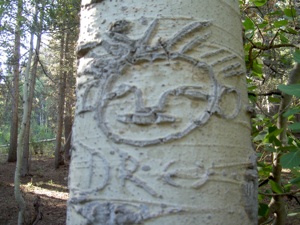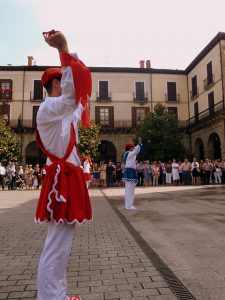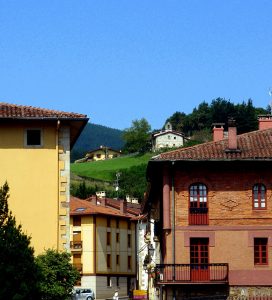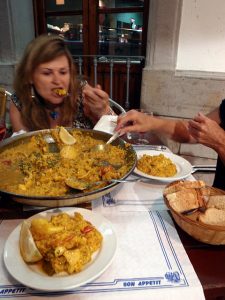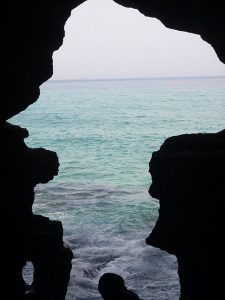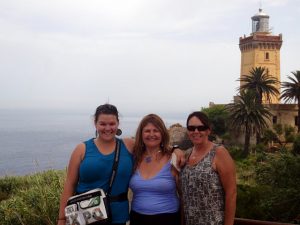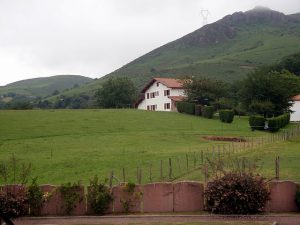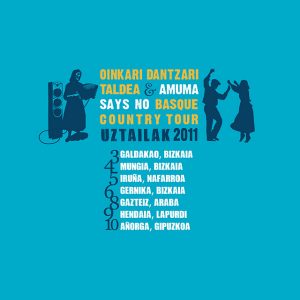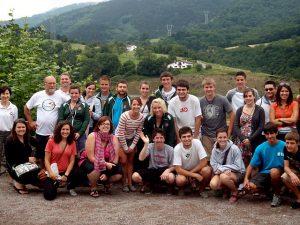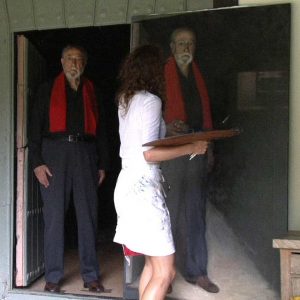The Basque-t Cases are a group of Basques — born in Euskadi, living there now, or first generation American-Basques — who are coming together virtually to discuss current events in the Basque Country. Think of it as a Basque round table. The intention is to provide some perspective on events occurring in Euskadi. The Basque-t Cases are:
 Henar Chico Jiménez: Born in Bilbao, Henar moved to Boise, Idaho when she was 21. She has rediscovered her Basque roots in the Basque diaspora.
Henar Chico Jiménez: Born in Bilbao, Henar moved to Boise, Idaho when she was 21. She has rediscovered her Basque roots in the Basque diaspora.
 Guillermo Zubiaga: Another Bilbaotarra, Guillermo relocated to New York City to pursue his passion in graphic arts.
Guillermo Zubiaga: Another Bilbaotarra, Guillermo relocated to New York City to pursue his passion in graphic arts.
 Joe Guerricabeitia: Joe is a first-generation Basque who has embraced his Basque heritage through his involvement with the Seattle Euskal Etxea.
Joe Guerricabeitia: Joe is a first-generation Basque who has embraced his Basque heritage through his involvement with the Seattle Euskal Etxea.
 Pedro J. Oiarzabal: After several years as a guest professor at the University of Nevada, Reno, Pedro returned to his native Euskalherria to continue his work on Basque anthropology and Basque identity.
Pedro J. Oiarzabal: After several years as a guest professor at the University of Nevada, Reno, Pedro returned to his native Euskalherria to continue his work on Basque anthropology and Basque identity.
 Last week, ETA, after about 40 years, called a definitive end to all violence. What does this mean for the Basque Country?
Last week, ETA, after about 40 years, called a definitive end to all violence. What does this mean for the Basque Country?
 It’s harder to make an objective assessment when you’ve spent the last 15 years living abroad and have been removed from day-to-day life in the Basque Country. However, I am very excited about the news; this time I feel that the ceasefire is going to stick. I also know it won’t be an easy process. Just this weekend I watched the news online from EiTB and La Sexta, and there are certain politicians that will never say anything positive if it’s related to ETA, not even about a definitive ceasefire.
It’s harder to make an objective assessment when you’ve spent the last 15 years living abroad and have been removed from day-to-day life in the Basque Country. However, I am very excited about the news; this time I feel that the ceasefire is going to stick. I also know it won’t be an easy process. Just this weekend I watched the news online from EiTB and La Sexta, and there are certain politicians that will never say anything positive if it’s related to ETA, not even about a definitive ceasefire.
On the other hand, ETA has yet to turn their weapons in and they have yet to apologize to their victims. I don’t think the latter will happen any time soon, or ever. Obviously, it’s easy for me to say let’s move forward and start building a new Basque Country because my whole family is alive and well. On the other hand, I want to make sure nobody else has to suffer, and I want my kids to only know about ETA from news articles and Wikipedia.
 Personally I think is quite encouraging to think of the possibility of a brighter future for my beloved Euskalherria. However I must say two things for those who see it otherwise. First I truly hope that those who still brandish the argument of “the Boy who cried wolf” are proven wrong. Secondly it makes me sad but doesn’t surprise me either that those who like in Julio Medem’s film refused to participate happen to be the same exact “bunch” who not only constrain from accepting this “olive Branch” but also insult it as a “mascarade” and further vilify its motive.
Personally I think is quite encouraging to think of the possibility of a brighter future for my beloved Euskalherria. However I must say two things for those who see it otherwise. First I truly hope that those who still brandish the argument of “the Boy who cried wolf” are proven wrong. Secondly it makes me sad but doesn’t surprise me either that those who like in Julio Medem’s film refused to participate happen to be the same exact “bunch” who not only constrain from accepting this “olive Branch” but also insult it as a “mascarade” and further vilify its motive.
The fact is that in the history of Humanity NOTHING absolutely NOTHING has been solved by those whose only argument has been the discourse of NEGATION. Moreover nobody shall forget that E.T.A, is not the conflict itself nor the origins of the conflict but RATHER the expression or the reaction against a much rather older, and longer dragging conflict and its unresolved issues. I am only glad that for the Hordes of Spanish Nationalist the end of E.T.A. liquidates not only its alibi but one of its biggest (if not its only one) political crusading propaganda.
Gorantziak danori!
Orain Bai
 I am cautiously, cautious. As an American-born Basque my perspective has always been from the outside-in, tethered by familial stories of la Guerra and Franquismo and reinforced by my own sporadic reading of various sources going further back to the Carlist wars, los fueros, through la Guerra, ETA’s evolution from EKIN and their landmark killing of Carrero Blanco, and retaliatory Spanish atrocities by GAL.
I am cautiously, cautious. As an American-born Basque my perspective has always been from the outside-in, tethered by familial stories of la Guerra and Franquismo and reinforced by my own sporadic reading of various sources going further back to the Carlist wars, los fueros, through la Guerra, ETA’s evolution from EKIN and their landmark killing of Carrero Blanco, and retaliatory Spanish atrocities by GAL.
ETA did not form in a vacuum and certainly history cannot be ignored, however, neither can the present. 2011 is giving way to 2012. For better or worse the last 20 years has seen Europe reiterate it’s commitment to a union that has all but disappeared internal borders and checkpoints and gone as far as adoption of a single currency.
Euskadi is no longer a quaint region in Spain that Hemingway foundly writes about; it’s a formidable player in business and industry. The world has taken notice of innovative COOPs like Mondragon, cutting-edge green technologies like solar and wind and the even the ability to re-invent itself, no better exemplified than in Bilbao’s recent history. Still, ETA has remained the elephant in the room and Euskadi’s most unfortunate export.
I hope for the days where I’ll be able proudly state I am Basque and not immediately be questioned about my position on “terrorism,” or whether it’s safe to walk the caminos my father, and his father before him, walked. Certainly those who have been there know, but even in this day and age of increased interconnectivity a lot of the message is obscured by what ETA has or has not done.
Certainly our Irish brothers to the North have seemed to have had some success in reintegrating their military arms and continuing the push for change politically. It is with that in mind and knowing that ETA and the IRA have and continue to have ties that I am hopeful that Euskadi as a whole will re-invent itself politically. It won’t be easy and it won’t happen over night but I hope with this latest affirmation for peaceful progress that it will happen.
Ondo izan munduko euskaldunak.
 My first recollection of ETA was the paintings on the walls. I thought “Is ETA good or bad?” Only a child could ask such a question. Over thirty-five years later ETA finally announced the cessation of its “armed activity.” However, there have not been any major public celebrations or spontaneous outburst of joy on the streets. I believe that we are all thrilled about the good news, but for most of us we basically have lived without even considering that ETA was there. It was already condemned to ostracism in our minds. Now, this ostracism has publicly crystallized. ETA did not have any other choice than declaring its end. Only god knows what the future will bring, but there is no turning back at this point.
My first recollection of ETA was the paintings on the walls. I thought “Is ETA good or bad?” Only a child could ask such a question. Over thirty-five years later ETA finally announced the cessation of its “armed activity.” However, there have not been any major public celebrations or spontaneous outburst of joy on the streets. I believe that we are all thrilled about the good news, but for most of us we basically have lived without even considering that ETA was there. It was already condemned to ostracism in our minds. Now, this ostracism has publicly crystallized. ETA did not have any other choice than declaring its end. Only god knows what the future will bring, but there is no turning back at this point.
 With the end of ETA and the rise of parties such as Bildu, how do you see the political future of Euskadi evolving, especially in the context of the “borderless” Europe that Joe mentioned?
With the end of ETA and the rise of parties such as Bildu, how do you see the political future of Euskadi evolving, especially in the context of the “borderless” Europe that Joe mentioned?
 I think it is too early to know what is going to happen on the political arena, particularly with the upcoming Spanish General Elections on November the 20th. On one side we have Bildu-Aralar, plus Sortu if legalized, and the PNV, and on the other side we have PP and PSOE. Anything is possible from here to the next Basque Autonomous Community elections in 2013. Will the PP still support the PSOE in the Basque Country if they gain the majority of the votes on November the 20th? Will the PSOE hold on to the Basque government or will they call for early elections? Will Sortu be legalized and become the new left-nationalist party taking over the Bildu-Aralar coalition? Will Aralar and EA disappear as independent parties?
I think it is too early to know what is going to happen on the political arena, particularly with the upcoming Spanish General Elections on November the 20th. On one side we have Bildu-Aralar, plus Sortu if legalized, and the PNV, and on the other side we have PP and PSOE. Anything is possible from here to the next Basque Autonomous Community elections in 2013. Will the PP still support the PSOE in the Basque Country if they gain the majority of the votes on November the 20th? Will the PSOE hold on to the Basque government or will they call for early elections? Will Sortu be legalized and become the new left-nationalist party taking over the Bildu-Aralar coalition? Will Aralar and EA disappear as independent parties?
 Well… pretty much the only argument used to make Herri Batasuna (with its subsequent name changes) illegal was that the party acted as ETA´s political arm. What are they going to use now if ETA is no longer part of the picture?
Well… pretty much the only argument used to make Herri Batasuna (with its subsequent name changes) illegal was that the party acted as ETA´s political arm. What are they going to use now if ETA is no longer part of the picture?
 How do you see the future of Basque nationalism in all of this? I’ve heard people say that small independent nations, such as what Euskadi would be in that scenario, are not so necessary in the context of the EU. Will Basque nationalism be even stronger, given the wider set of parties to represent those views or will Basques become more accepting of the status quo?
How do you see the future of Basque nationalism in all of this? I’ve heard people say that small independent nations, such as what Euskadi would be in that scenario, are not so necessary in the context of the EU. Will Basque nationalism be even stronger, given the wider set of parties to represent those views or will Basques become more accepting of the status quo?
 I don’t think Basques will ever stop having a nationalistic sentiment, however, I think it won’t be as extreme. In my opinion, one’s sense of protection – in this case of a country and its language and culture – is heightened when feeling threatened or oppressed. As the situation in the Basque Country turns more and more peaceful I believe the nationalistic sentiment will become more subdued.
I don’t think Basques will ever stop having a nationalistic sentiment, however, I think it won’t be as extreme. In my opinion, one’s sense of protection – in this case of a country and its language and culture – is heightened when feeling threatened or oppressed. As the situation in the Basque Country turns more and more peaceful I believe the nationalistic sentiment will become more subdued.
 I am not a political analyst yet I think of two potentialities: First of all in view of the last 2009 elections, or better yet the “maneuvers” to obtain those rather “demographically flawed” results, neither the Spanish left (PSOE) nor the right (PP) fully realized the impetus they gave to the abertzale sentiment…. Case in point the later results during the “autonomics”.
I am not a political analyst yet I think of two potentialities: First of all in view of the last 2009 elections, or better yet the “maneuvers” to obtain those rather “demographically flawed” results, neither the Spanish left (PSOE) nor the right (PP) fully realized the impetus they gave to the abertzale sentiment…. Case in point the later results during the “autonomics”.
Furthermore If we add to this premise ETA’s most contemporary statement surely a con-natural to Bildu being a legal party I think the overall disposition is going to be towards full independentism (which may or may not necessarily have to do with ” nationalism”).
Only time’ll tell
 So far, there has been a reorganization of the Basque political parties into Spanish left (PSOE, EB) and right nationalist (PP, UPN) and Basque left (Bildu-Amaiur) and right nationalist (PNV), which clear the political panorama. Even more, none of the them seem to me that their nationalist aspirations are watering down, much the opposite. ETA has clear the path for everyone to set their agendas on the table. If, as the Spanish establishment has repeated many times, everything is possible without violence, then I cannot see why Basque nationalism´s future is going to be somehow badly affected by changing the scenario.
So far, there has been a reorganization of the Basque political parties into Spanish left (PSOE, EB) and right nationalist (PP, UPN) and Basque left (Bildu-Amaiur) and right nationalist (PNV), which clear the political panorama. Even more, none of the them seem to me that their nationalist aspirations are watering down, much the opposite. ETA has clear the path for everyone to set their agendas on the table. If, as the Spanish establishment has repeated many times, everything is possible without violence, then I cannot see why Basque nationalism´s future is going to be somehow badly affected by changing the scenario.
 I agree with Henar that Basques will continue to have a nationalistic sentiment and that the intensity of the this desire has much to do with being oppressed. Politically this has played out in the last 30 years with the “Spanish” political entity which is “Euskadi” (Bizkaia, Gipuzkoa, Araba) vs what has become the “French” Pays Basque — a much looser affiliation without it’s own budget. Certainly ETA and the stronger nationalistic sentiment has been voiced in Spain where the oppression was clear, direct and Franquista.
I agree with Henar that Basques will continue to have a nationalistic sentiment and that the intensity of the this desire has much to do with being oppressed. Politically this has played out in the last 30 years with the “Spanish” political entity which is “Euskadi” (Bizkaia, Gipuzkoa, Araba) vs what has become the “French” Pays Basque — a much looser affiliation without it’s own budget. Certainly ETA and the stronger nationalistic sentiment has been voiced in Spain where the oppression was clear, direct and Franquista.
Still I agree with Guillermo: “Only time will tell.” There is a lot going on in Europe financially and politically and common problems may overshadow cultural differences.
 Joe, exactly “…..Basques will continue to have a nationalistic sentiment,” like before Aita Larramendi or Sabino Arana, may be more or less accentuated. However in regards of E.T.A. we must understand that it is/they are not the problem or the conflict itself nor the origins of the conflict but rather (and as I have been saying) the expression or the reaction against an older, and longer, dragging conflict and its unresolved issues.
Joe, exactly “…..Basques will continue to have a nationalistic sentiment,” like before Aita Larramendi or Sabino Arana, may be more or less accentuated. However in regards of E.T.A. we must understand that it is/they are not the problem or the conflict itself nor the origins of the conflict but rather (and as I have been saying) the expression or the reaction against an older, and longer, dragging conflict and its unresolved issues.
 Guillermo, I completely agree. That’s why I mentioned previously reading about the Carlist wars, los Fueros, etc… History has a way of repeating itself which is why it’s important as mirror. You have to look into it and realize you are making the same mistakes. Euskaldunak have some choices to make in the next month and I am interestingly awaiting to see what they do, but certainly the issues in Euskadi are much older than one generation.
Guillermo, I completely agree. That’s why I mentioned previously reading about the Carlist wars, los Fueros, etc… History has a way of repeating itself which is why it’s important as mirror. You have to look into it and realize you are making the same mistakes. Euskaldunak have some choices to make in the next month and I am interestingly awaiting to see what they do, but certainly the issues in Euskadi are much older than one generation.
 I hope history does not repeat itself! Of course, we shouldn’t forget what happened, but we should learn from it and move on to building a better Euskadi. I am curious as well to see what’s going to happen in the next few months.
I hope history does not repeat itself! Of course, we shouldn’t forget what happened, but we should learn from it and move on to building a better Euskadi. I am curious as well to see what’s going to happen in the next few months.
Also, I wish Basques would finally be given the choice to decide on their future. Personally, I have yet to make up my mind about independence, but if the process was peaceful and fair, I’d be open to whatever the outcome may be.
 Everyone, this has been a great discussion. Eskerrik asko! Any parting words?
Everyone, this has been a great discussion. Eskerrik asko! Any parting words?
 I’ve enjoyed having a voice, thanks for the idea, Blas. And nice to talk to you guys, Joe, Guillermo and Pedro.
I’ve enjoyed having a voice, thanks for the idea, Blas. And nice to talk to you guys, Joe, Guillermo and Pedro.
 Eskerrik asko danori!
Eskerrik asko danori!
 Thank you all. Eskerrik asko Blas.
Thank you all. Eskerrik asko Blas.
Share this / Partekatu hau:
Like this:
Like Loading...







